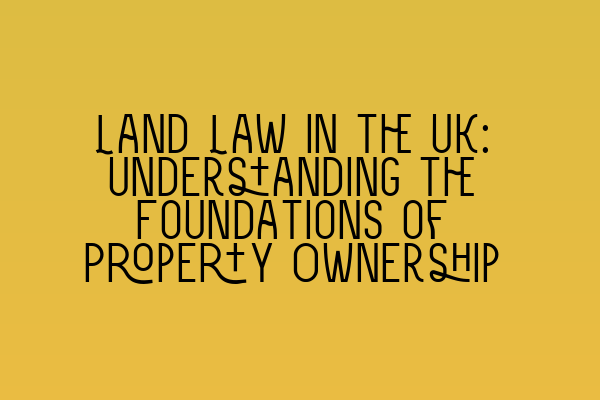Land Law in the UK: Understanding the Foundations of Property Ownership
Welcome to another informative blog post by SQE Property Law & Land Law. In this post, we will delve into the intricate world of land law in the UK, shedding light on the foundations of property ownership. Whether you are a homeowner, a lawyer, or simply someone interested in the legal aspects of property, this article is for you. Let’s dive in!
What is Land Law?
Land law, also known as real property law, is a branch of law that deals with the rights, interests, and obligations associated with land and the structures built on it. It governs the ownership, use, transfer, and regulation of land in the UK.
The Importance of Property Ownership
Property ownership is a fundamental aspect of society. It provides individuals and businesses with security, stability, and investment opportunities. Understanding the legal principles and rights associated with property ownership is crucial to protect one’s interests and ensure a smooth functioning of the property market.
Key Concepts in Land Law
1. Freehold and Leasehold
In the UK, there are two primary forms of property ownership: freehold and leasehold. Freehold means owning the land and any structures on it indefinitely, while leasehold refers to having a lease or a contractual agreement that grants the right to use a property for a specific period.
2. Legal and Equitable Interests
Property interests can be classified as legal or equitable. Legal interests are enforceable in a court of law, while equitable interests involve equitable principles and remedies. Both types of interests have their own rights and obligations, which must be understood to ensure proper property management.
3. Registered and Unregistered Land
In the UK, land can be registered or unregistered. Registered land is recorded in the Land Registry, providing a clear record of ownership and other relevant details. Unregistered land, on the other hand, lacks a formal registration, and ownership and other rights must be proven through other means.
4. Easements and Covenants
Easements and covenants are important legal terms in land law. Easements refer to rights of way or rights to use someone else’s land for a specific purpose, while covenants are legally binding agreements that impose obligations or restrictions on the use of land.
Why Understanding Land Law Matters
Whether you are a homeowner, a landlord, a tenant, or a legal professional, having a solid understanding of land law is vital. It helps you navigate property transactions, resolve disputes, protect your rights and interests, and make informed decisions regarding your property.
At SQE Property Law & Land Law, we offer comprehensive SQE preparation courses, including resources and training for land law. Our courses help aspiring solicitors and legal professionals deepen their knowledge of land law, ensuring they are well-prepared for the Solicitors Qualifying Examination (SQE) and their future careers. Check out our SQE 1 Preparation Courses and SQE 2 Preparation Courses to get started on your journey.
In addition, if you are looking to test your knowledge, take a look at our SQE 1 Practice Exam Questions and SQE 1 Practice Mocks FLK1 FLK2. These resources will challenge your understanding of land law and help you identify areas for improvement.
Stay tuned for more educational and valuable content on property law and land law. For any legal assistance or guidance, don’t hesitate to contact SQE Property Law & Land Law, your trusted solicitors specializing in property law matters. We are here to help!
For more information about SRA SQE exam dates, visit our article on SRA SQE Exam Dates.
